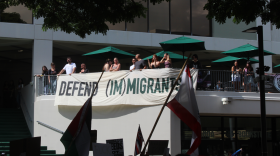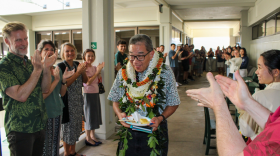Researchers from the University of Hawaiʻi Cancer Center have made groundbreaking progress toward helping patients with mesothelioma live longer lives.
Michele Carbone and Haining Yang, both doctors leading a team of UH researchers, received several grants for the project — including a $2.6 million grant from the National Institutes of Health in 2019.
Their goal was to study the role of the BAP1 gene in mesothelioma, one of the most deadly cancers known to humans.

Mesothelioma is a cancer of the mesothelium, found in the lining of tissue covering several internal organs in the human body. Patients diagnosed with the diagnosis typically only live for one to two years.
But that timeline could change with Carbone and Yang's recent findings.
Typically, patients with mesothelioma have copies of the BAP1 gene which aid in cell growth and division. When stabilized by HIF1, a protein complex that plays a role in the body's response to low oxygen levels, tumor cells grow.
Their team found that isolating the BAP1 gene triggers a lower concentration of oxygen in the tumor cell— making it more difficult to grow, especially when accompanied by therapy.
This finding has the potential to extend patients' lives by seven years or even cure them, according to the study.
The team studied families affected by this genetic mutation for over 10 years, and they are now following 94 families across the U.S.
"They often come here to the Cancer Center in Hawaiʻi to see us to donate their blood, their specimens, and study them. Now as we were studying them, we discovered something that was totally unexpended," said Carbone.
Carbone’s team is now working on reproducing the effects of the BAP1 mutation. After successful tests in the lab, the treatment will need to go through a clinical trial.
To access the full study, click here.





